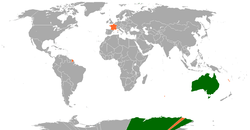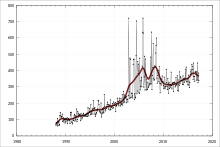Australia–France relations
 | |
Australia |
France |
|---|---|
Australia–France relations deals with the diplomatic relations between Australia and France, as well as the historical contacts, shared values of democracy and human rights, substantial commercial links, and a keen interest in each other's culture.
The two countries maintain diplomatic relations in each other's countries. The French embassy in Australia is in Canberra, and the ambassador is Christophe Lecourtier. The Australian embassy in France is at 4 rue Jean-Rey, in the 15th arrondissement of Paris. Since 2014, the ambassador has been Stephen Brady, who also has non-resident accreditation for Morocco, Monaco, Algeria and Mauritania.[1]
Relationship


The legacy of Australian involvement on French soil in the First and Second World Wars plays an important role in the bilateral relationship. Over 45,000 Australians lost their lives on French soil in the two conflicts. Each year many Australians travel to the Western Front to commemorate the thousands of Australians who were killed and injured there in World War I.
Dialogue and practical cooperation between France and Australia has been strengthening on many fronts in recent years, including on key global security issues such as arms control and disarmament, non-proliferation and counter-terrorism. The Pacific region, where both countries have direct interests, continues to be an important focus of bilateral engagement. Commercial links are substantial and France is an increasingly important source of direct investment and technology, including in the defence sector, for Australia. Cooperation in the surveillance of valuable fisheries resources is also an area of ongoing bilateral activity.
There has been an expansion of the defence relationship between Australia and France in recent years. On 14 December 2006 a new Defence Cooperation Agreement between the two countries was signed, providing a framework for further cooperation. Australia and France regularly participate in combined force training exercises and France provided support to the Australian-led INTERFET operations in East Timor. Australian and French forces have co-operated in the Pacific and Southern Oceans, including for emergency and disaster relief and operations against illegal fishing. Australia and France have also cooperated at various levels in the coalition against terrorism, including as founding members of the Proliferation Security Initiative to combat the trafficking in weapons of mass destruction. In 2008, it was announced that France and Australia would strengthen their defence cooperation further in the Pacific region.[2]
Australia and France have a dynamic relationship in all fields of the arts, with Australian artists enthusiastic to work within the French cultural tradition, and many French counterparts keen to explore Australia's vibrant younger culture. Institutional links are encouraged within the framework of the 1977 Australia–France Agreement on Cultural and Scientific Cooperation. The Australian Embassy in Paris administers the Australia–France Foundation, which promotes cultural exchanges between the two countries and publishes a quarterly newsletter 'L'Australie en France' promoting Australian activities in France. The Department of Foreign Affairs and Trade's Cultural Awards Scheme has also promoted cultural relations between Australia and France.
Australia has made a significant contribution to the Musée du quai Branly, a major international museum dedicated to the world's indigenous arts and cultures that opened in Paris in June 2006. A permanent installation of works by eight Australian Indigenous artists commissioned by the Australian Government has been incorporated into the structure of one of the main buildings of the museum.

Tourist links between the two countries are significant, with over 400,000 Australians visiting France each year. Almost 98,000 visitor visas were granted to French nationals to visit Australia in 2005–06, making France the 10th largest source of visitor visa grants, and 1,867 student visas were granted. A working holiday-maker agreement signed between the two countries in November 2003 makes it easier for young French and Australian people to spend time in each other's countries. In 2005–06, 6,126 Australian working holiday visas were granted to French nationals, making France the 7th largest source of working holiday visitors, and 483 were granted to Australians.
Australia and France have maritime borders between their territories. The locations of these boundaries were formalised through the Australia–France Marine Delimitation Agreement which came into effect on 10 January 1983.
In August 2009, Nicolas Sarkozy became the first serving French leader to visit Australia.[3] The Courier Mail reported that "serious bilateral issues" for Sarkozy and Kevin Rudd to discuss included "the war in Afghanistan and global warming".[4]
François Hollande visited Canberra in November 2014 after the G20 Summit in Brisbane. Meeting with Tony Abbott, Hollande reinforced the strong bonds forged between the two nations in both world wars, stating that "we will have an opportunity to recognise the sacrifice of Australian soldiers who came to save France twice, and we will never forget this."[5]
In April 2016, the Australian Government decided to purchase a conventional variant of the Barracuda-class nuclear submarine designed by DCNS to replace its Collins-class diesel-electric submarines currently in service. Twelve submarines will be constructed in Adelaide by ASC Pty Ltd and will cost in excess of A$50 billion.[6]
French influence on Australia
Some of France's strongest cultural influences on Australia have been in the fields of viticulture (wine-making) and cheese-making.
In the field of painting, Australian impressionism was marginally influenced by the French movement. More significantly, Australian painters of the 19th century were influenced by the French en plein air practices.
French music and chanson has had little influence on Australian music styles, despite the success of Australian musicians David Lewis (a member of the Paris Combo) and Tina Arena in France. Likewise, Australian filmmakers have not readily adopted French cinematic styles such as nouvelle vague.
French novelists have had little impact in Australia, partly due to delays in their works being translated. Avante-garde movements like the nouveau roman were never popular in Australia. More often, 19th century authors such as Jules Verne and Victor Hugo have proven more popular.
French philosophers and psychoanalysts such as Jacques Derrida, Gilles Deleuze, Félix Guattari. Jacques Lacan and Michel Foucault have had a significant impact on cultural studies departments of Australian universities, albeit they are invariably filtered heavily through American and Jewish academic influences first. More often than not, these academics' theories are applied in ways they have not been in France. For instance, Derrida and Lacan's theories have been used in Australian universities' literature departments more often than they have in the academics' actual fields of study, most often with very eccentric results.
Politically, the relationship between France and Australia has remained strong throughout the 20th and 21st centuries. Public sentiment took a dive, however, in the 1970s during the French nuclear testing in the Pacific on Moruroa. During this period, there was a boycott of French wines, French restaurants and other things associated with France, such as items on menus. There was also a union ban on mail to France. Another strain in the relationship took place following the French sinking of the Rainbow Warrior, the Greenpeace boat, in New Zealand in the 1980s.
French is still one of the most commonly taught foreign languages at Australian high schools, though, as an optional course, very few students continue to study it through to completion. Thus, it is rare to find people who are truly fluent in the language. Telopea Park School, an Australian public school, recognised and supported by the French government, is a unique education partnership in Australia.[7]
There has been a strong growth over the past five years in audiences in Australia for French films, with more than 1.3 million admissions in 2010, as compared to less than 500,000 in 2005. French films are the fourth most popular, preceded only by English language films from the USA, UK and Australia. Each year, around forty French films are sold to Australian distributors for commercial release, not including films released on DVD. SBS buys the rights to distribute over 70 French films annually for broadcast on free-to-air TV, and generally screens one or two French films per week. The Alliance Française French Film Festival is an annual event jointly organised by the Alliance Françaises of Sydney, Melbourne, Brisbane, Canberra, Perth and Adelaide and is supported by the French Embassy.
Treaties
A significant number of Australia–France bilateral treaties include: treaties concerning the war and its aftermath, science, defence, taxation, trade, extradition, and the Antarctic. The recent purchase of Submarines from France is also part of a treaty.[8]
See also
References
- ↑ "Ambassador to France", Department of Foreign Affairs and Trade, Australian Government, March 31, 2014.
- ↑ "Australia & France to increase defence ties in the Pacific", ABC Radio Australia, September 17, 2008
- ↑ "President Sarkozy to make history on visit to Australia", The Times, May 26, 2009
- ↑ "French President Nicolas Sarkozy to visit Australia", Courier Mail, May 24, 2009
- ↑ Pianegonda, Elise; Gul, Jonathon (19 November 2014). "French president Francois Hollande backs Australian military alliance and possible free trade deal". Australian Broadcasting Corporation. Retrieved 19 November 2014.
- ↑ Henderson, Anna (26 April 2016). "Australian submarines to be built in Adelaide after French company DCNS wins $50b contract". ABC News. ABC News (Australia). Retrieved 26 April 2016.
- ↑ "Agreement between the Government of Australia and the Government of the French Republic concerning the Establishment of a French - Australian School in Canberra (1983) ATS 8". www3.austlii.edu.au. Retrieved 5 July 2017.
- ↑ Massola, James (9 July 2017). "Turnbull, Macron fly in to Paris as Trump left out in the cold at G20 on climate". The Sydney Morning Herald. Retrieved 9 July 2017.

